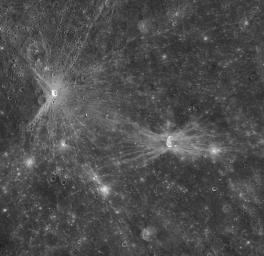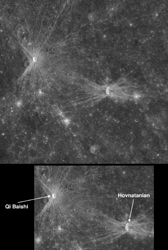
|
Low Angle Impacts: A Look at Qi Baishi and Hovnatanian
- Click the image above for a larger view
- Full-Res JPEG (1581 x 1536) (307.5 kB)
- Full-Res TIFF (1581 x 1536) (2.4 MB)
Caption:

Click on the image
for larger version
This NAC image shows Qi Baishi and Hovnatanian, two craters that were newly named in November 2008 ( PIA11762 ). Qi Baishi is named for the famous Chinese painter who died in his nineties in 1957. Hovnatanian is named for the nineteenth century Armenian painter Hakop Hovnatanian. Both craters are relatively small but exhibit bright ray systems, indicating that they are comparatively young features on Mercury's surface, as discussed in the earlier release for Enwonwu ( PIA11784 .)
Qi Baishi has an asymmetric pattern of ejecta rays, which formed by an object travelling to the east or to the west and impacting Mercury's surface at a very low incidence angle. However, Qi Baishi crater is still roughly circular, which is in contrast to the elongated shape of neighboring Hovnatanian crater. Hovnatanian crater and its "butterfly" pattern of ejecta rays were created by an impact at an even lower angle than that which formed Qi Baishi. From the "butterfly" pattern of rays, the Hovnatanian impactor was travelling either north-to-south or south-to-north prior to hitting Mercury's surface.
Date Acquired:
January 14, 2008
Instrument:
Mosaic created with images taken by the Narrow Angle Camera (NAC) of the Mercury Dual Imaging System (MDIS)
Resolution:
500 meters/pixel (0.3 miles)
Scale:
Qi Baishi has a diameter of 15 kilometers (9.3 miles). Hovnatanian has a diameter of 34 kilometers (21 miles).
Background Info:
These images are from MESSENGER, a NASA Discovery mission to conduct the first orbital study of the innermost planet, Mercury. For information regarding the use of images, see the MESSENGER image use policy .
Cataloging Keywords:
| Name | Value | Additional Values |
|---|---|---|
| Target | Mercury | |
| System | ||
| Target Type | Planet | |
| Mission | MESSENGER | |
| Instrument Host | MESSENGER | |
| Host Type | Orbiter | |
| Instrument | Mercury Dual Imaging System (MDIS) | |
| Detector | Narrow Angle Camera (NAC) | |
| Extra Keywords | Crater, Grayscale, Impact | |
| Acquisition Date | ||
| Release Date | 2009-03-10 | |
| Date in Caption | 2008-01-14 | |
| Image Credit | NASA/Johns Hopkins University Applied Physics Laboratory/Carnegie Institution of Washington | |
| Source | photojournal.jpl.nasa.gov/catalog/PIA12039 | |
| Identifier | PIA12039 | |
